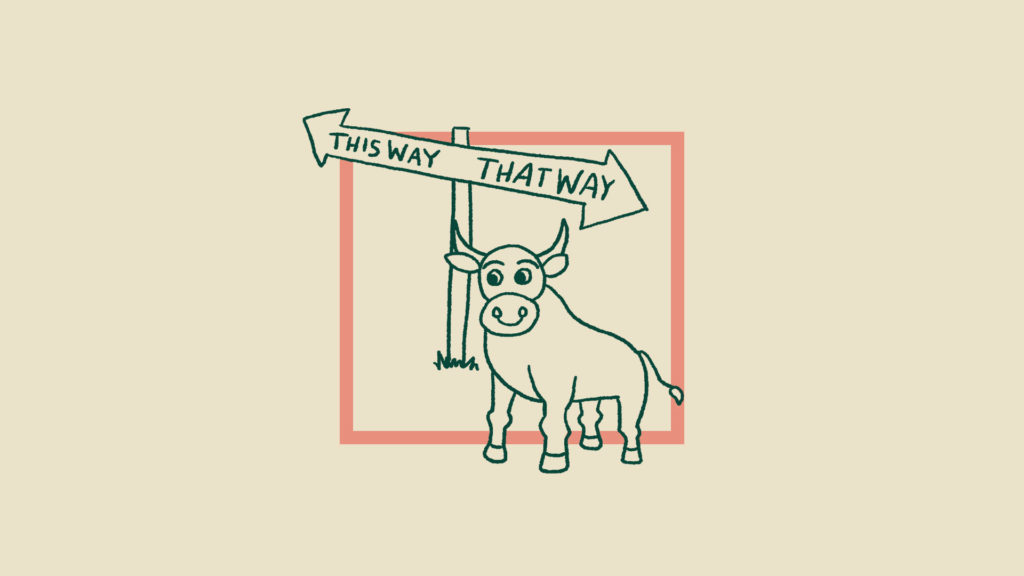Psychologists Art Markman and Bob Duke give advice on what to do when you reach a crossroads in your career.
Q: I recently finished my master’s program in the human services field while maintaining my career in the business world. Now that it is time to transition—with less pay, mind you—I’m so torn. Am I wanting to transition to this new field I just spent three years studying just because I finished the degree, or do I genuinely want to pursue it? I’m having second thoughts and feeling like I have to transition just because I earned the degree, but deep down do not believe I’m ready right now, if at all. Help!
—Degreed and Confused
Dear Degreed:
Dilemmas like yours are not uncommon, as you might imagine, but it’s important to consider that there’s something quite enviable about having a stable job and now also having an opportunity to embark on a new career if you want. So, your deliberation should start with a recognition that you’re already in a pretty good place.
Your description of the situation (including the pay differential, which you knew about before starting your degree, right?) gives the impression that you began work on the master’s program because you felt that your current occupation was less than satisfying and that you wanted to make a different kind of contribution.
One factor that creates doubt about changing jobs that (as we have pointed out on many shows) brains are efficient, and another word for efficient is “lazy.” So, your brain will often steer you away from situations that thrust you into the unknown, because the unknown is most often unpredictable, and unpredictability means more work for your brain. That means that you are biased to prefer the known job to your unpredictable future if you switch careers.
However, one bias that may drive you toward switching careers is that you may have come to feel “trapped” by your current job. Surprisingly, just putting yourself in a position to choose whether you stay in your job may make your current career seem less aversive. No longer do you have to be here, you can actually choose. Psychologists call this ability to choose agency. You might be feeling better about your current career, because you now have the agency to leave it at any time.
As you decide, you should avoid factoring into your decision what you’ve already invested on your master’s. Resources like the time, money, and effort you’ve spent on your new degree are what economists call “sunk costs.” Studies show that people often factor these sunk costs into their decisions about whether to continue with something or bail on it. But, why should you endure something you find less than pleasant just because you have invested in it? If a play is bad, you should leave it at intermission no matter how much you spent on the tickets. If you don’t really love what you studied, you shouldn’t change careers just because you spent three years in school.
Something we have talked about on our show pretty often is regret. Studies suggest that young people tend to regret the dumb things they’ve done, failed exams, fights with friends, or hangovers—many of which become good stories later in life. But adults in their 80s generally regret things they didn’t do, like never traveling to Europe, learning to play a musical instrument, or writing a novel.
Studies suggest that young people tend to regret the dumb things they’ve done, but adults in their 80s generally regret things they didn’t do.
You should take advantage of your brain’s remarkable ability to imagine yourself in the future. Pretend you’re old. Look back on your life and ask what you might regret not having done. If you think that you will regret not making the job switch, then that is a good way to motivate yourself to take the plunge.
It is clearly not easy to take a pay cut, especially if there are others who rely on you financially. But it’s possible to plan for that in advance. Perhaps you can work in your current career for another year, but start spending money as if you had changed jobs. Put that extra in the bank.
Other studies suggest that how happy you are after you make a decision depends on what you focus on. After the decision’s made, there will be good days and bad days. On the good days, it is easy to feel great about the choice you made, but on bad days, you should avoid the temptation to think back to the option that you didn’t pick, which will likely make you miserable.
There are many paths to finding life satisfaction. Chances are, you’ll make a pretty good go of it no matter what you choose. There is a tendency to believe that momentous choices like a career change determine whether you’ll be happy for the rest of your life, but a lot of research suggests that the best predictor of how happy you’ll be six months after a big life change (good or bad) is how happy you were in the months before the life change.
If you make a conscious decision to enjoy the option you select, chances are you will.
—Dr. Art Markman and Dr. Bob Duke
The Bull x The Horns advice column is authored by psychologists Art Markman and Bob Duke, hosts of the Two Guys on Your Head podcast. This column represents the advice of Dr. Art Markman and Dr. Bob Duke and not the views or opinions of Frost Bank.
